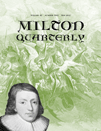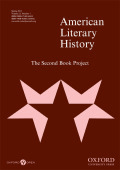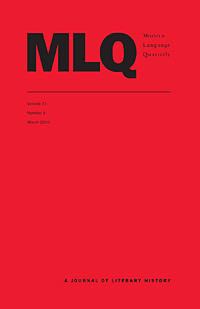
CAMBRIDGE QUARTERLY
Scope & Guideline
Engaging Minds in the Art of Literary Analysis
Introduction
Aims and Scopes
- Literary Criticism and Theory:
The journal publishes articles that delve into various aspects of literary criticism and theory, examining how texts can be interpreted through different critical lenses including feminism, postcolonialism, and psychoanalysis. - Historical Contextualization:
There is a consistent emphasis on situating literary works within their historical contexts, allowing for a deeper understanding of the socio-political influences on literature from various eras. - Interdisciplinary Approaches:
The Cambridge Quarterly encourages interdisciplinary studies that connect literature with other fields such as philosophy, psychology, and visual arts, thereby enriching the discourse around literary studies. - Cultural Commentary:
The journal often includes discussions on how literature interacts with cultural movements and societal changes, reflecting on the role of literature in shaping and responding to cultural narratives. - Exploration of Marginalized Voices:
A significant focus is placed on exploring lesser-known authors and works, particularly those from marginalized communities, thus contributing to broader discussions about representation and inclusivity in literary studies.
Trending and Emerging
- Interdisciplinary Studies:
There is a growing trend towards interdisciplinary approaches that integrate literature with other fields such as visual arts, music, and philosophy, showcasing the interconnectedness of cultural expressions. - Contemporary Voices and Issues:
An increasing number of articles focus on contemporary authors and pressing social issues, indicating a shift towards relevance in current cultural and political discussions. - Exploration of Genre Blending:
The journal is seeing a rise in publications that explore genre blending, particularly in how contemporary writers are redefining traditional genres and creating new forms of narrative. - Focus on Performance and Adaptation:
Emerging themes include the study of literature in relation to performance and adaptation, reflecting the dynamic interplay between text and its various interpretations in different media. - Environmental and Ecocritical Perspectives:
There is a noticeable increase in articles addressing ecological themes and the role of literature in environmental discourse, highlighting the relevance of literary studies in contemporary global challenges.
Declining or Waning
- Traditional Canonical Texts:
There seems to be a decreasing emphasis on traditional canonical works, as the journal shifts towards more contemporary and diverse voices, reflecting a broader cultural shift in literary studies. - Straightforward Historical Narratives:
The journal has moved away from purely historical analyses that do not engage with contemporary issues, indicating a preference for more complex, layered interpretations that connect past and present. - Static Literary Forms:
There is a waning focus on rigidly defined literary forms, as the journal increasingly embraces experimental and hybrid forms of writing that challenge conventional boundaries. - Biographical Criticism:
While biographical studies have been a staple in literary criticism, there is a noticeable decline in articles focused solely on author biography, as the journal prioritizes thematic and contextual analyses. - Local or National Literary Studies:
The journal is increasingly global in its scope, suggesting a decline in articles that focus exclusively on local or national literary traditions, in favor of more transnational and comparative perspectives.
Similar Journals

MILTON QUARTERLY
Exploring the Depths of Miltonic InfluenceMILTON QUARTERLY, published by Wiley, is a premier academic journal in the field of Literature and Literary Theory. Since its inception in 1967, it has become a leading platform for scholarly discourse, focusing on the works and influence of John Milton and extending to broader themes in literary studies. With an impressive Q1 ranking in its category, the journal is recognized for its high-quality peer-reviewed articles and contribution to advancing literary scholarship. Although it currently does not offer open access options, its impact in the academic community is undeniable, boasting publications that resonate well beyond its pages. The journal is an invaluable resource for researchers, professionals, and students alike, keen on exploring the intersections of literary theory, history, and criticism, making significant contributions to the understanding of literature throughout the centuries.

AMERICAN LITERARY HISTORY
Advancing Scholarship in American Literary ContextsAMERICAN LITERARY HISTORY, published by Oxford University Press Inc, is a leading peer-reviewed journal dedicated to advancing the understanding of American literature within the broader contexts of cultural studies and history. With an impressive impact factor reflecting its Q1 ranking in Cultural Studies, History, and Literature and Literary Theory, this journal serves as an essential resource for researchers, professionals, and students alike. Covering a wide range of topics, it seeks to illuminate the historical and cultural dynamics that shape literary production in the United States from 1989 to 2024. Although not an open access journal, AMERICAN LITERARY HISTORY remains a pivotal platform for scholarly discourse, encouraging rigorous scholarship and critical engagement with literary texts. The journal's strong Scopus rankings further emphasize its significance, ranked among the top journals in its field, making it an indispensable tool for anyone seeking to explore the rich tapestry of American literary heritage.

Criticon
Empowering voices in contemporary discourse through open access.Criticon is a distinguished open-access journal published by PRESSES UNIV MIDI-PUM in France, dedicated to advancing scholarship in the fields of History and Literature and Literary Theory. Since its transition to open access in 2014, Criticon has fostered a vibrant academic community, enabling the dissemination of high-quality research that contributes significantly to contemporary discourse. Positioned within the Q4 categories for both History and Literature, the journal boasts impressive rankings, including #152 out of 1106 in Literature and Literary Theory, reflecting its growing influence with a remarkable 86th percentile standing. With a dedication to interdisciplinary scholarship, Criticon invites researchers, practitioners, and students to submit original articles that explore the intersections of literary and historical narratives, thereby enriching the understanding of cultural and intellectual history. Located at 5 ALLEES ANTONIO MACHADO, F-31058 TOULOUSE, FRANCE, this journal not only serves as a platform for new voices but also as a beacon for established scholarship in the humanities.

Eixo e a Roda-Revista de Literatura Brasileira
Celebrating the Vibrancy of Brazilian Literary VoicesEixo e a Roda-Revista de Literatura Brasileira is a pioneering academic journal dedicated to the exploration and dissemination of Brazilian literature, published by the Federal University of Minas Gerais, Faculty of Letters. Since its inception in 1982, this Open Access journal has provided a vital platform for researchers, educators, and enthusiasts to share innovative ideas and critical analyses related to Brazilian literary studies. With its ISSN 0102-4809 and E-ISSN 2358-9787, the journal attracts a diverse readership and invites submissions that contribute to the richness of Brazilian cultural discourse. Located in Belo Horizonte, Brazil, the journal plays a critical role in advancing scholarly dialogue and promoting accessibility in literature research, fostering an inclusive environment for academic exchange.

ItinerArios-Revista de Literatura
Illuminating the Depths of Literary DiscourseItinerArios-Revista de Literatura is a distinguished academic journal published by Universidade Estadual Paulista (UNESP), located in the vibrant city of Araraquara, Brazil. With a commitment to exploring the depths of literary analysis and theory, this journal serves as a crucial platform for scholars, researchers, and students to disseminate their work in the field of literature. Though the journal does not currently offer open access, it boasts a comprehensive focus on various literary traditions, critical interpretations, and emerging trends within the literary landscape. The ISSN for the print edition is 0103-815X, ensuring its recognition in the academic community. By providing a valuable forum for innovative research and engaging discussions, ItinerArios plays an essential role in enriching the discourse in the realm of literary studies, appealing to professionals and enthusiasts alike who are eager to contribute to and engage with contemporary literary scholarship.

MODERN LANGUAGE QUARTERLY
Illuminating the Intersection of Language and Society.MODERN LANGUAGE QUARTERLY, published by DUKE UNIVERSITY PRESS, stands as a premier journal in the field of Literature and Literary Theory, recognized for its intellectual rigor and scholarly contributions. With an impressive Scopus ranking of #156 out of 1106 in its category, the journal showcases an 85th percentile standing, indicating its significant impact within the academic community. The journal, with ISSN 0026-7929, focuses on critical analysis, literary theory, and the intersection of language and culture, making it an essential resource for researchers, professionals, and graduate students alike. As it converges from 1996 to 2024, MODERN LANGUAGE QUARTERLY continues to uphold its tradition of excellence in literary scholarship, contributing to the advancement of knowledge and fostering a deeper understanding of literature's role in society. With its Q1 ranking in 2023, this journal represents the forefront of literary studies, providing a vibrant forum for the exchange of ideas and innovative research in the humanities.

LITTERATURES
Unveiling the Layers of Literary MeaningLITTERATURES is a distinguished academic journal dedicated to the exploration of literature and literary theory, published by UNIV TOULOUSE MIRAIL. With its ISSN 0563-9751, this journal provides a platform for innovative research and critical analysis in the humanities, particularly within the field of literature. Although currently not indexed with an official e-ISSN and with a history of coverage discontinued from Scopus from 2004 to 2015, LITTERATURES continues to contribute valuable insights and scholarly discourse in contemporary literary studies. Researchers will find its publications vital for examining the intersections of literary theory and practice, while students and professionals can benefit from its rigorous academic contributions. While the journal's Scopus rank places it within the 14th percentile among literature journals, its focus on French and international literature enriches the global literary landscape and encourages meaningful scholarly exchange. The journal is based in Toulouse, France, and invites contributions that challenge existing paradigms and inspire new interpretations within the realm of literature.

ROMANISTISCHE ZEITSCHRIFT FUR LITERATURGESCHICHTE-CAHIERS D HISTOIRE DES LITTERATURES ROMANES
Delving into the Depths of Literary HeritageROMANISTISCHE ZEITSCHRIFT FUR LITERATURGESCHICHTE-CAHIERS D HISTOIRE DES LITTERATURES ROMANES, published by Universitätsverlag C Winter Heidelberg GmbH, represents a significant contribution to the field of literary studies, focusing on the intricate histories of Romance literatures. With an ISSN of 0343-379X and an E-ISSN of 2509-7474, this journal strives to foster critical discourse among scholars, professionals, and students interested in literature and literary theory. Although its coverage in Scopus was discontinued in 2018, and it currently lacks open access options, the journal's past contributions have established it as a noteworthy resource, with a Scopus rank that reflects its engagement with the arts and humanities. The journal's unique scope, which spans various periods and styles, encourages interdisciplinary approaches and invites submissions that explore the evolution and impact of Romance literature across cultures. As a critical platform for emerging and established voices in the field, the ROMANISTISCHE ZEITSCHRIFT continues to be a valuable asset for those dedicated to the scholarship of literary history.

PAMIETNIK LITERACKI
Championing Open Access to Literary KnowledgePAMIETNIK LITERACKI is a distinguished peer-reviewed journal dedicated to advancing the fields of Literature and Literary Theory, published by WYDAWNICTWO PAN, INST BADAN LITERACKICH PAN in Poland. With an ISSN of 0031-0514 and E-ISSN of 0031-0514, this journal has been operating under an Open Access model since 2012, ensuring wide accessibility and dissemination of scholarly work. The journal has undergone a journey through various categories, currently positioned in the Q4 quartile according to the 2023 category rankings in Literature and Literary Theory, with a Scopus rank of #1009/1106 placing it in the 8th percentile. PAMIETNIK LITERACKI serves as a critical platform for scholars, providing a venue for innovative research, discussions, and reviews that shape the literary discourse in Poland and beyond. For those passionate about literary studies, this journal represents a vital resource for both established researchers and emerging voices in the field.

JOURNAL OF MODERN LITERATURE
Illuminating Modern Texts Through Scholarly InsightJOURNAL OF MODERN LITERATURE, published by Indiana University Press, is a distinguished peer-reviewed journal that delves into critical examinations of modern literary texts and theories. Since its inception, the journal has served as a vital platform for scholars dedicated to the exploration of contemporary literature, making significant contributions to the discourse within the field. With an impressive ranking of Q2 in the Literature and Literary Theory category as of 2023, it positions itself among the top-tier journals in its domain, reflecting its strong impact within academic circles. This journal not only fosters scholarly dialogue but also embraces innovative approaches to literary criticism, ensuring relevance in today’s dynamic cultural landscape. Researchers, professionals, and students will find a rich repository of articles that engage with various modern literary paradigms, enhancing their understanding and appreciation of the intricate relationships between literature and broader socio-cultural contexts. Though it does not operate under an open access model, the journal's extensive reach through its digital ISSN (1529-1464) and print ISSN (0022-281X) allows for valuable insights to be disseminated to the appropriate audiences.